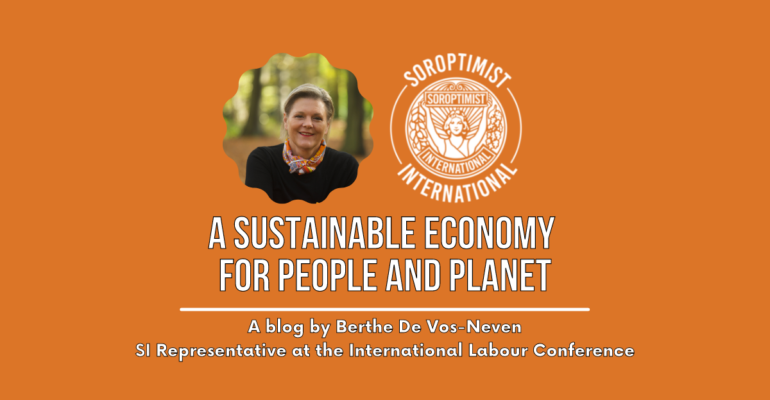A blog by SI UN Representative, Berthe De Vos-Neven.
“The International Labor Conference (ILC) is the highest decision-making body of the ILO. 187 tripartite delegations from governments, trade unions and workers meet every year to discuss priority matters related to the world of work. The 110th Session was held 27 May – 11 June, and for the first time was organised in a hybrid way.
During the meetings the delegations held a general discussion and took decisions on health and safety, and social and solidarity economy (SSE).
‘Health and Safety’: a discussion between 2 conventions (C155 or C187). After discussion, a 5th category was added to the Declaration on Fundamental Principles and the Right at Work of 1998, which describe the right to safe and healthy working conditions:
- freedom of association and the effective recognition of the right to collective bargaining;
- the elimination of all forms of forced or compulsory labour;
- the effective abolition of child labour;
- the elimination of discrimination in respect of employment and occupation.
- the “occupational safety and health” (the new fifth category).
A very important detail: ILO Member States, regardless of their level of economic development, committed to respect and promote these principles and rights, whether they have ratified the relevant Conventions or not.
There was a lot of discussion on various points of decent work and social economy and solidarity, including:
- a universal definition;
- the contribution of social and solidarity economy to decent work and sustainable development;
- how can governments, workers’ and employers’ organisations promote the SSE’s contribution to human-centered recovery;
- necessary actions by the Internatational Labour Organisation (ILO) to promote the social and solidarity economy.
The meetings started with some discussion around the topic of this year. Some delegates express happiness because in the ILC’s 103-year history, finally social economy and solidarity are being discussed. Others mentioned that the social economy has been in the ILO texts since 1922 and they refer to the” cooperatives”. The Cooperative Service was established in 1920 and until today the International Cooperative Alliance holds a general status at the ILO. But it is certainly accurate to say that this is the first comprehensive debate in the UN system on social and solidarity economy (SSE).
There were more discussions around the proposals of the draft conclusions and a lot of amendments were made by the tripartite delegates. Finally, a consensus was reached, and the conclusions reflect the importance of the roles that SSE entities can accomplish: helping people in vulnerable situations, such as people with disabilities, youth, and women.
The following conclusions on SSE have been agreed and they can be outlined in 6 parts:
- Introduction: the links between the SSE and the ILO is emphasised by the direct referencing to the ILO Constitution, including the Declaration of Philadelphia, relevant international labour standards and declarations that explicitly recognise the importance of the SSE in its various forms: promoting sustainable development, decent work, productive employment, and improved living standards for all.
- Definition of the SSE: this is the first time a tripartite definition of the SSE at the international level has been agreed. This clear definition is based on a set of values and principles: “The social and solidarity economy encompasses enterprises, organisations and other entities that are engaged in economic, social, and environmental activities to serve the collective and/or general interest, which are based on the principles of voluntary cooperation and mutual aid, democratic and/or participatory governance, autonomy and independence, and the primacy of people and social purpose over capital in the distribution and use of surpluses and/or profits as well as assets. Social and solidarity economy entities aspire to long-term viability and sustainability, and to the transition from the informal to the formal economy and operate in all sectors of the economy. They put into practice a set of values which are intrinsic to their functioning and consistent with care for people and planet, equality and fairness, interdependence, self-governance, transparency and accountability, and the attainment of decent work and livelihoods. According to national circumstances, the social and solidarity economy includes cooperatives, associations, mutual societies, foundations, social enterprises, self-help groups and other entities operating in accordance with the values and principles of the SSE” (ILC.110/Record No. 7B(Rev.1)).
- Guiding principles to address challenges and opportunities to promote decent work and the SSE for a human-centered future of work. The role and potential of the SSE in addressing the needs in the care economy and facilitating the transition from the informal to the formal economy was an important point during the discussion. Also, the inclusivity of women, youth and disadvantaged groups is mentioned in part III.
- The role of governments and the social partners: the role of the ILO is mentioned as well as the obligations of the Member States, mainly the obligation to respect, promote and realise the fundamental principles and rights at work, including across social and solidarity economy entities. Fostering the SSE’s economic, social, and environmental contributions.
- The role of the ILO: provides recommendations and key principles for actions. The focus lays on providing legal and policy advice, training & education, advocacy, exchange, and dissemination of good practices, …
- Annex: provide a “non-exhaustive list of instruments of the International Labour Organisation and the United Nations relevant to decent work and the social and solidarity economy”.
These conclusions on decent work and the SSE confirm the important role that SSE has in the challenges of the post-pandemic period and nurturing a planet and people-oriented career future. Furthermore, it provides the right guidelines for all to promote decent work in and through SSE in the future. A strategy and action plan of these conclusions will be developed by the office, and these will be distributed to all Member States.”
Click HERE for more information on the 110th Session of the International Labour Conference.

